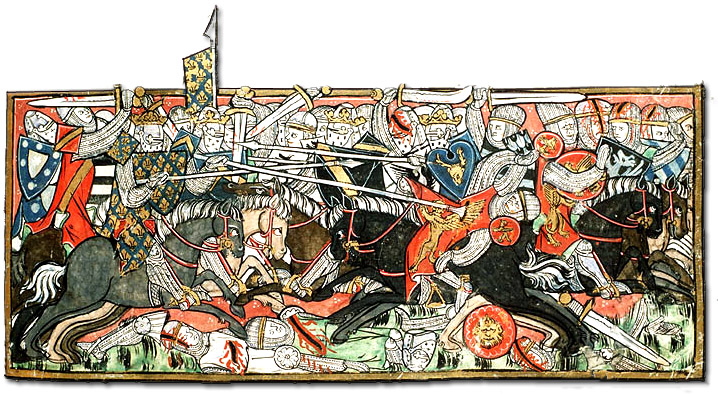 |
| A sculpture of Saint Clotilde, 12th century |
About 900 years before Joan of Arc fought for her French
king and country, another woman was planting the roots of France as “the eldest
daughter of the Catholic Church.” St. Joan of Arc is honored as the patron saint of France,
but St. Clotilde, whose feast was historically celebrated today, could
legitimately lay claim to the title as well.
Daughter of a king, from a race of Teutonic warriors,
Clotilde was given a name which means “famous in battle.” Many traditional
Germanic names reflect the warrior cult of the barbarian tribes: Gertrude –
“spear of strength”; Matilda – “might in battle”; Hildegarde – “fortress”;
Kriemhilde – “battle mask”; Brunhilde – “battle armor”; Adelheid – “nobility.”
Clotilde’s father, Chilperic, was king of Burgundy – an area in what is now
part of France, settled by the Germanic tribe of Burgundi after they received it from
the Romans. It was through the Romans that Christianity was brought into the
area. By Clotilde's birth in 474, the heresy of
Arianism was widespread among Germanic peoples, yet Chilperic and his wife Caretena remained faithful Catholics and raised their children in the faith. Clotilde's only sister took religious vows at the convent of St. Victor in Geneva.
In her 18th year, Clotilde became the wife of Clovis I, King of the Franks. The Franks were a Germanic tribe from the lower Rhine area, who, crossing that river, had pushed into Gaul and become allies of the Romans. Because of their contact with the Romans, the Franks were the most educated and literate of the Germanic tribes.
St. Gregory of Tours in his history notes that the Frankish kings wore their hair long, flowing over the shoulders. When the Roman Empire collapsed, much of Gaul came under the control of the Franks; and Clovis, becoming a Frankish king in 481, continued to extend his kingdom through the conquest of more territories. The Franks were pagans, but Clovis was on friendly terms with the bishops of northern Gaul and did not see Clotilde's religion as a hindrance to their union. Too, Clotilde's family probably did not think it wise to deny one of the most powerful men of the region his request for their daughter.
 |
| Baptism of Clovis by St. Regimius |
It seems to have been a happy marriage, and Clotilde had great influence over her husband. Yet her efforts to persuade him to embrace the Catholic faith were not immediately successful, although he did allow their first two sons to be baptized. It was written of Clovis, "how he, a man of keen intelligence would not yield until he was convinced of the truth." Yet, when he did convert, it was in a dramatic fashion. During a battle against the Alemanni, another Germanic tribe, when his men seemed on the point of succumbing to the enemy, he appealed to "Clotilde's god" for aid, vowing to accept the Christian faith if he was granted victory. He won and was baptized in Rheims cathedral on Christmas day, 496. At the same time, 3,000 of his Frankish warriors also were baptized. It is easy to cynically assume that Clovis's impetuous conversion was not genuine, yet every evidence of the time proves that it was sincere. The conversion of his men made sense according to the mindset of the warrior class. Clovis was their lord, and they had vowed allegiance to him - where he went, his men followed. The Catholic faith naturally spread throughout the Frankish kingdom under the influence of Clovis and Clotilde. It was thus that a large area of what was later named France became Catholic and the eventual defenders of Catholic interests in the West.
Clovis died at the age of 45 in 511 and was buried at the Church of Sts. Peter and Paul in Paris. Clotilde's next 34 years of widowhood were not happy. It was the barbarian custom to divide power among the dead king's sons. This had its roots in the pagan idea that the kings were descended from the gods. Thus "divine blood" flowed equally in the veins of each of the king's sons and one could not be chosen over the others to reign. All must share in the kingdom. In the warrior spirit, this naturally led to feuds and eventually fratricide. The Franks had accepted Christianity, but they were not yet far removed from their barbarian culture and attitudes. Clovis's kingdom was divided between his three living sons, who caused their mother much anguish in their fierce and often bloody rivalry. Clotilde, the first Catholic queen of the Frankish kingdom, died in 545 and was buried beside her husband.
 Further reading: Light to the Nations, Part One - chapter 5
Saint Clothilde: The First Christian Queen of France Tells Her Story
Further reading: Light to the Nations, Part One - chapter 5
Saint Clothilde: The First Christian Queen of France Tells Her Story



No comments:
Post a Comment